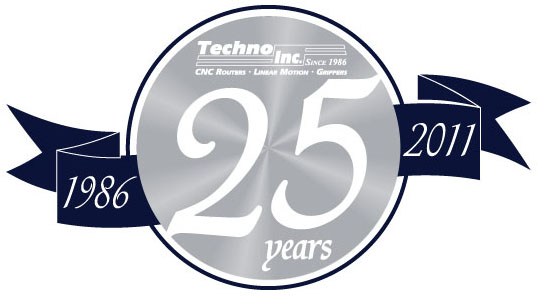|
 University
of Waterloo uses a Techno CNC Router to Execute a Variety of 3D
Processes University
of Waterloo uses a Techno CNC Router to Execute a Variety of 3D
Processes
|
|
Published on Feb
11, 2013, by University of Waterloo School of Architecture
Composites can perform multiple
functionalities at the same time and can be largely customized
through CNC fabrication processes. Within the architectural
domain, design and fabrication research in composites could
provide the opportunity to develop buildings as complex systems
which simple constituents could physically interact performing
multiple functionalities at the same time as a whole. By shape,
the functionalities of structure, habitable space, and skin
might become integrated.
 However,
adopting composite materials in architecture would require smart
designs capable of expressing the nature of the materials as
well as the CAM processes employed for their manufacturing.
Hereby, integrating fabrication logic as parametric variable of
the design becomes crucial to produce large, detailed parts of
complex geometry in a fast and precise manner. Developing
completely automated manufacturing processes is an especially
critical aspect. However,
adopting composite materials in architecture would require smart
designs capable of expressing the nature of the materials as
well as the CAM processes employed for their manufacturing.
Hereby, integrating fabrication logic as parametric variable of
the design becomes crucial to produce large, detailed parts of
complex geometry in a fast and precise manner. Developing
completely automated manufacturing processes is an especially
critical aspect.
In this pursuit, one of the challenges of our agenda was to
research composite building systems of complex geometry with
integrated connection details designed as to be fabricated using
a simple small-size 3 axis CNC router. In 3-axis routers the
cutting tool cannot be always normal to a complex surface. Such
a constraint has great impact on the design and fabrication
process; however, if it is regarded as an operative variable,
great design opportunities are open for exploration.
Such exploration has
been at the core of the research agenda of the deep FORMATIONS
Design Studio directed by Marco Verde, Adjunct Assistant
Professor at the School of Architecture of the University of
Waterloo. Along the course, students have got especially close
to matter and fabrication in order to
understand design and fabrication
as strictly entwined aspects of a unique process. Final aim of the course
was to design, detail and prototype adaptable construction systems in
composite materials pursuing scalable and fast fabrication processes as well
as clean assembly strategies.
For this purpose, the Techno CNC Router at our disposal at the DLAB at the
School of Architecture has been a perfect companion. Simple calibration and
control, a user friendly touch screen, and no-downtime due to mechanical
issues allowed to get the machine ready to execute a variety of 3D processes
such as roughing and finishing of complex moulds and final 3D contouring to
cut parts off the moulds. The entire process has been extremely precise and
parts produced where clean and immediately ready for assemblage.
Indeed the machine employed was among the smallest machines offered by
Techno Inc., however it made the entire processes reliable and supported the
prototyping of precise corroborative prototypes made of small-size, complex,
interlocking composite parts in a smooth manner. Finally, the flexibility of
Techno CNC Router greatly contributed to the achievement of extraordinary
results in a very limited amount of time.
|
|



 Affordable Precision Educational CNC Routers
Affordable Precision Educational CNC Routers Techno is celebrating over 25 years of CNC technology
expertise. Our Educational sector provides industrial quality products
at educational prices with a network of award-winning Educators. We can
provide CNC Curriculums, CNC Projects, Technical Information and
Packages for any educational classroom.
Techno is celebrating over 25 years of CNC technology
expertise. Our Educational sector provides industrial quality products
at educational prices with a network of award-winning Educators. We can
provide CNC Curriculums, CNC Projects, Technical Information and
Packages for any educational classroom.
